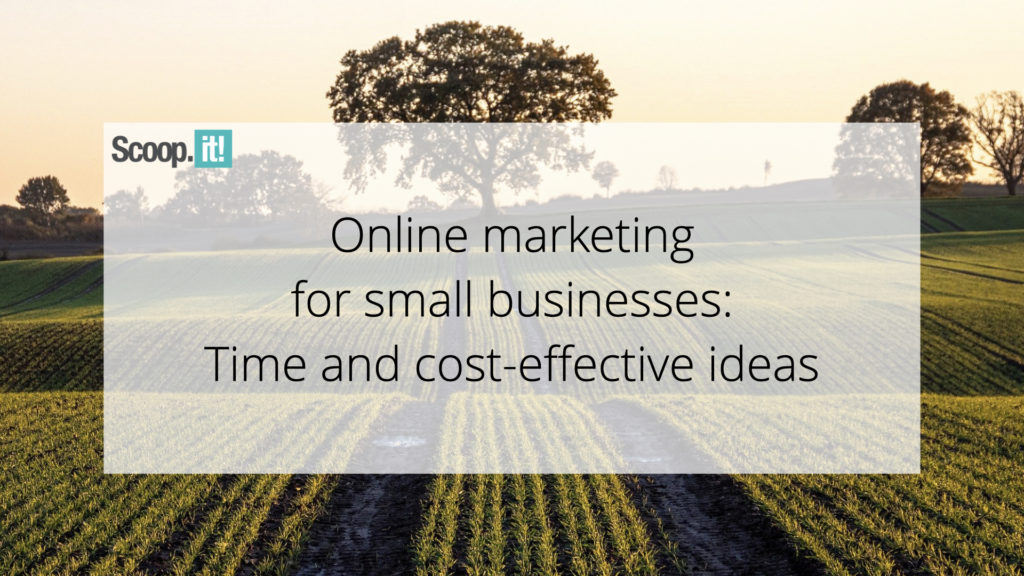
If you run a small business, you have a dizzying array of choices when it comes to online marketing.
On one hand, it’s fantastic that smaller firms can operate on such a level playing field with larger competitors. Modern marketing is about way more than an advertising budget, and there are many ways to increase business exposure with time and expertise, rather than hard cash.
However, on the flipside, the plethora of options can feel overwhelming – potentially leaving you unsure which of a thousand directions to run in.
This article is intended to help with that. It lays out a whole range of different online marketing ideas for small businesses. While some of them involve ongoing work, others are activities that you can simply pick from the list and spend an hour on.
The ideas here also don’t (necessarily) involve a significant financial commitment – making them both time and cost-effective.
Let’s get started.
Create a Google My Business Account
Creating a Google My Business account certainly ticks the “quick” box, and it’s completely free too.
Google My Business links in with what Google calls a Business Profile. You will, no doubt, have seen these before. They are the panels that show key business details, including location, office hours, and customer reviews. This profile also ties in with Google Maps, so your business shows up on that platform.
It’s well worth setting aside 30 minutes to “claim” your business, provide full and correct information, and even incorporate keywords around what you do to aid in SEO (more on that below).
Improve your Website’s SEO
SEO can seem complicated and daunting. However, for most businesses, there are some easy, “quick wins” that can prove both cost and time-effective.
For example, a simple audit of your website could reveal things like missing meta descriptions on your pages, the need for a clear site map, or an opportunity to incorporate more keywords into your content. All of these things, when separated, are reasonably quick tasks to deal with one by one. You can use SEO software to help you with site audit and keyword research.
While on the subject of SEO, it’s essential to mention Google’s increasing focus on “Page Experience,” which primarily relates to the speed of your site. If you’ve yet to address this, it’s well worth dedicating some time to it.
Start a Blog
It can feel as if everybody has a blog nowadays – and it’s fair to say that applies to most companies too. However, many firms get blogging wrong, pushing out mediocre content or – even worse – publishing a couple of posts and then leaving everything to go dormant.
There are two key things to get right: frequency and quality. You should know better than anybody what your customer base will find useful, so concentrate on creating the best blog posts on those subjects. Keep them coming at a regular pace also, so both your readers and Google know your blog is active.
It’s fair to say that there is a certain time commitment involved in creating good blog content. However, if you or somebody internal can create it, there’s zero cost attached.
Set up a Referral (or Affiliate) Program
It’s always desirable to have other people selling your business on your behalf.
Affiliate and referral schemes work for all kinds of business, whether you’re selling physical products or online or in-person services. And just as there are many schemes, there are many ways to implement them – from automated affiliate networks to bespoke arrangements with others in your industry.
It makes sense to take a “blank sheet of paper” view of this. Who out there has an existing audience for what your company is selling? Start there, and then work out a mutually beneficial way to tap into that audience.
With these arrangements, you’re only spending money when you’re generating it, making this strategy extremely cost-effective. If you choose an automated affiliate platform, you need very little time to get things set up.
Be Active on Facebook Groups
Like blogging, Facebook marketing is something lots of companies do but don’t do well.
Facebook groups are a great place to market your products and services – and this doesn’t just mean your own groups. It’s well worth familiarizing yourself with the most lively and populated groups in your industry, and getting properly involved in them.
One incredibly important thing: You must participate in these groups in a way that’s truly helpful to the community. A sure-fire way to make yourself unpopular and get short shrift is to jump straight in – sharing links and trying to sell things.
However, playing more of a long game is fair and valid. If you provide genuine help and advice over a sustained period, neither the members nor the moderators will likely mind if you do some occasional promotion. Meanwhile, you’re building your brand and raising your profile.
Yes, you need to set aside some time to do this properly – but not an enormous amount.
Work with Influencers
The world of “influencers” is something that leaves many people cold, and it is fair to say that working with influencers is a better fit for some businesses than others.
However, in certain niches – from fashion to skincare to healthy living – influencer marketing can pay big dividends.
If you decide to go down this road, it’s much better to think about genuine partnerships than purely financial relationships. Product endorsements from influencers who are truly passionate about what you have to offer are far preferable to cynical, money-driven pitches. Most modern internet users can see right through the latter anyway.
An endorsement from the right person with the right audience can result in a quick burst of sales – with very little effort involved.
Engage on LinkedIn
LinkedIn is a platform many businesses overlook and don’t properly understand. Plenty of people join LinkedIn, have a browse around, and never really grasp how to make good use of it.
This creates a great opportunity for those willing to invest time in the platform. This is another example of online marketing where you can pay in effort rather than money.
As with contributing to Facebook groups, this is NOT about lazy self-promotion, which LinkedIn members will usually ignore. But if you provide authentic, useful content, such as informative articles or videos, you can make the right people take notice.
Start Email Marketing
The biggest and most successful companies never waste an opportunity to collect a customer email address. That’s because they know there’s truth in the old cliche that “the money’s in the list.”
Email marketing gives you an opportunity for direct dialogue with customers, using a medium that remains popular, despite endless new ways to communicate online. Statista estimates that the number of global email accounts will grow by another half a billion by 2025.
The time and cost involved in effective email marketing are lower than you might expect. Email marketing software are simple to set up, and most have a free tier until your company’s email list begins to grow. The charges usually begin to increase once you have over 500 members.
This is one of those tasks you can get off the ground with just a couple of hours of free time.
Leverage Curated Content
Making use of curated content achieves two objectives at once: Firstly, it gives you a way to keep your audience engaged – with more information than you could produce yourself. Secondly, it helps you to ensure you’re staying with the pulse of your industry.
Curated content can help you to provide more in your newsletters and blogs, and demonstrate that you’re at the forefront of industry developments. If you use an automated platform like Scoop.it, you can keep a hefty volume of content flowing without much in the way of cost, or human intervention.
Repurpose and Recycle Content
Good content doesn’t have to be a “use once” kind of deal. For example:
- Quotes from your articles can form social media posts.
- Key points of articles can evolve into video slideshows.
- Blog posts can be expanded or compiled into courses.
- Snippets of longer content can find their way into anything from Linkedin posts to Instagram stories.
Some of the most successful internet marketers are masters of reusing content again and again. Different mediums usually have different audiences, so it’s not the case that people will mind (or even notice) that you’re doing more than one thing with your content.
This strategy also has a big impact on both cost and time commitment. Say, for example, that a blog post is destined to also form the basis of a video series and a collection of posts for different social networks. If that’s the case, the time (or financial) investment in it is much more worthwhile.
Do it once, do it well, and then make sure you use it in as many ways as possible.
Host Webinars
Webinars are yet another example of where technology allows smart small businesses to compete with big players.
Consumers love to get something for nothing. Webinars give you the opportunity to provide that, at the same time as having a captive audience for what you’re selling.
There’s one really important key here: You must make the webinar worth attending regardless of whether an individual buys what you’re selling. Give away some of your best insights and advice – and make it so worthwhile that people want to know how to pay for more.
While running a webinar might seem like a big deal, it’s another example of where technology makes things simple. If you can handle an online call, you can run a webinar. And if you’ve taken notice of the above point on reusing content, there may not even be much preparation involved.
Final Word
The small business marketing ideas above form a menu of just some of the things you can do to push your business forward online. It’s unlikely you’ll want to do all of them, and even less likely that you already are.
The key is to focus on a couple at a time. As we’ve seen, none come with an enormous time or money commitment. They’re easily slotted into a day with just a couple of spare hours. Which are you going to tackle first?


